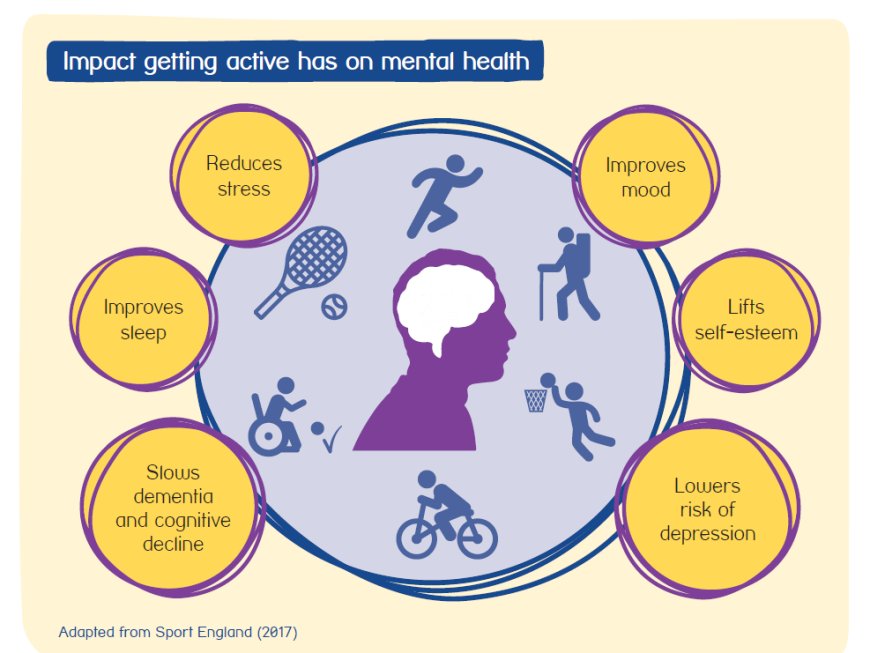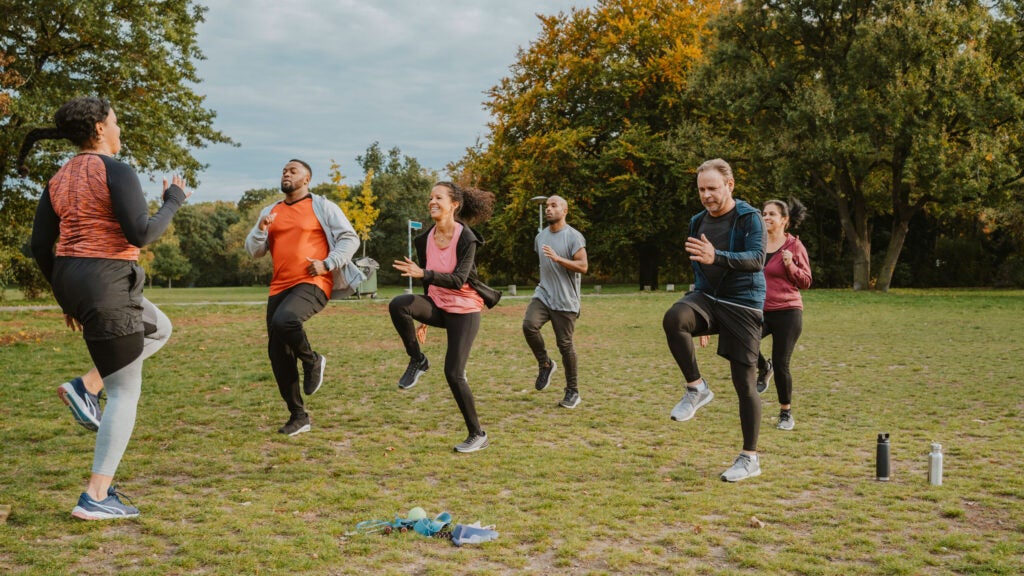The Powerful Link Between Exercise Benefits and Mental Health Awareness
We explore the vital connection between mental health awareness and the benefits of regular exercise. Physical activity isn’t just about building strength — it's a powerful tool for boosting mood, reducing stress, and improving overall emotional well-being. From easing symptoms of anxiety and depression to enhancing self-esteem and sleep quality, exercise offers countless mental health benefits. We'll also highlight simple, practical ways anyone can incorporate more movement into their daily lives to support both mind and body.

Exercise: The miracle treatment for mental health?
Campaigns and initiatives such as World Mental Health Day have helped to raise awareness of mental health difficulties (e.g., Norwich City FC video below). Mental health difficulties can affect anyone – it is estimated that 1 in 4 people experience a mental health problem each year, which means that most of us will be affected by a mental health condition at some point in our lives, either directly or through someone close to us. It is vital that once someone has taken the difficult step to disclose mental health difficulties they can access the right treatment and support, however, the NHS is struggling to meet the demand for mental health services. It is estimated that only 1 in 3 people with common mental health difficulties are getting the treatment they need. There are various treatment options available including talking therapies and medication, but medication is reported to be the most commonly used treatment for mental health problems. In recent years there has been a significant rise in the number of people taking antidepressant medication, which comes with a huge financial cost to the NHS, and it has been suggested that non-pharmacological treatments should be prioritised for those with mild to moderate depression. If only there was a low-cost treatment with few side effects and many additional health benefits. Well there is – exercise!
Quick Tips to Boost Mental Health Through Exercise:
Start with 10–15 minutes of walking a day.
Join a local team or fitness class for accountability.
Try outdoor activities to combine exercise with nature.
Set small, realistic goals — progress is more important than perfection!

Exercise has long been recognised as an effective intervention in both the prevention and treatment of mental health conditions. For example, in their meta-analysis of the literature exploring exercise in the treatment of depression Heissel et al. (2023) found exercise to be an effective treatment for those with depression. Similarly, exercise has also been found to be an effective tool in the prevention of depression (Hu et al., 2020). The simple logic behind the link between exercise and mental health is that exercise can make us feel better. This means that exercise can benefit your mental health whether or not you have a diagnosed mental health problem. As well as combating diagnosed mental health conditions such as depression, exercise can enhance mood and reduce stress levels, thus allowing us to tackle daily challenges in a more positive, optimistic and constructive way. Up and down the country there are many people who are advocates for the beneficial role of exercise in preventing and treating mental health conditions. A few years ago I was lucky enough to meet a group of inspiring people who were referred to a scheme which involved prescribing exercise as part of a programme to tackle mental health conditions such as depression and anxiety. A clear message from these participants was that exercise was a powerful tool in helping them to combat mental health challenges. They described exercise as a far more positive treatment than medication.
There lots of evidence to show that exercise can have a positive impact on mental health, but why is this the case? What is it about engaging in physical activity that leads to enhanced mental health? There is no one theory or hypothesis that has been universally accepted to explain the link between exercise and mental health. Instead, several different hypotheses have been proposed. These can be split into two categories: physical or psychological explanations (see Table 1). It may be that a combination of factors is causes improvements in mental health, rather than one factor alone. Additionally, because people differ greatly, explanations for improvements in mental health may vary according to the individual concerned.
Why Adolescent Mental Health Matters
The teen mental health crisis has not abated. In fact, one study showed that 42 percent of students surveyed “felt persistently sad or hopeless.” And another survey revealed that 5 million adolescents between the ages of 12 and 17 experienced at least one major depressive episode.
Why is developing and maintaining positive mental health essential in adolescence? Not only can poor mental health result in poor grades, strained family relationships, and an overall gloomy outlook on life, many of these behaviors that develop in adolescence carry over into adulthood.
Additionally, mental health problems in young people often co-occur with other health and behavioral risks. These can include drug or alcohol misuse, or risky sexual behaviors that can result in STDs or an unintended pregnancy.
How to Support Teen Mental Health
The CDC (Centers for Disease Control and Prevention) says helping adolescents maintain positive mental health comes down to the following:
- Helping students feel connected to school/family
- Building bonds and relationships with adults and friends at school
- Letting young people know someone cares about them
Involvement in teen athletics contributes to all of these outcomes and more. Let’s explore more science-backed ways sports have a positive influence on teen mental health.
10 Scientifically Validated Mental Benefits of Sports
Scientists have been exploring the link between exercise and mood for more than 100 years. As a result, they have produced a large body of research on physical activity and mental health, including the link between sports and mental health. Both biological and psychological factors come into play.
Here are 10 mental benefits of sports validated by research:
- Exercise positively impacts levels of serotonin, a chemical that helps regulate mental health, and stimulates the neurotransmitter norepinephrine, which improves mood.
- Physical activity releases endorphins, the body’s natural “happy chemicals,” and reduces levels of the stress hormone cortisol.
- Sports are associated with lower rates of stress, anxiety, depression, body image issues, and suicidal behavior.
- Participation in team sports reduces the risk of teen substance abuse and other reckless behaviors.
- Team sports enhance resilience, empathy, confidence and empowerment.
- They have also been shown to increase executive functioning, creativity, cognitive development, and self-regulation.
- Improved teamwork and social responsibility are additional benefits of team sports for mental health.
- The more time spent being physically active, the less time a teen spends on social media, which is proven to lower adolescent well-being.
- Teen sports, as well as other outdoor activities, get teens outside so they can experience the benefits of time in nature.
- Sleep improves when teens are physically active—which is important because sleep is essential for maintaining mental health.
What Are the Additional Benefits of Playing a Sport?
In addition to reducing stress and anxiety, regular exercise improves physical health, thereby boosting teens’ self-esteem and self-confidence.
Teams sports offer a way for teens to connect and bond with others in their age group with similar interests. Being part of a team helps teens build critical skills that carry through to adulthood, such as goal setting, critical thinking, working collaboratively with others.
Multiple studies show that adolescent and teen sports correlate with higher grades. An analysis of 4,746 middle and high school students found that increasing their activity levels from less than 2.5 hours per week of moderate-to-vigorous exercise to 7 hours per week was associated with a 5.7 percent to 9.1 percent increase in the students’ grades.
Physical activity is often prescribed as an affordable, self-sustaining way to prevent and manage symptoms of depression and anxiety. A 2021 study involving data from 70,000 high school students found a direct link between sport and mental health. Adolescents involved in a sport saw improvements in sleep, self-esteem, and psychological distress.
Moreover, research shows that team sports may be more supportive for athletes’ mental health than individual sports: One study found that young athletes in individual sports were almost twice as likely to report symptoms of depression (13 percent vs. 7 percent).
The Pandemic Impact on Sports and Mental Health
Perhaps nothing shed more light on the benefits of teen sports on mental health than the lack of sports during the pandemic. The abrupt shutdown of sports organizations during COVID had a profound effect on adolescents’ mental health.
One report showed that adolescents showed worsened signs of depression, anxiety, anger, sleep, and quality of life, especially those who played team sports. Girls experienced these symptoms as a higher rate than boys, and the impact was also higher on those low socioeconomic backgrounds.
Is Exercise as Effective as Medicine?
Another study showed that physical activity can be as effective as antidepressants. Researchers divided participants with depression into three groups. One group took part in an exercise program, one group took an antidepressant, and third group exercised and also took medication. After 16 weeks, depression had eased in all three groups. However, a follow-up study, done six months later, found that the effects of exercise actually lasted longer than those of antidepressants.
Rollerblade ambassador Javi Garrido was inspired to give back and mentor young athletes because of the impact the sport had on her as a child. She said skating “helped me overcome a challenging childhood, pull myself out of depression, and taught me a path of constant self-improvement.”
“When I see a student overcome themselves or relax and enjoy something that used to cause them so much frustration, I feel completely fulfilled,” she said. “It’s also because I know that as human beings, we learn tools that we later apply to our lives.”
To Ward Off Anxiety, Get Moving
In addition to reducing symptoms of depression, physical exercise such as team sports has been shown to decrease symptoms of anxiety. In a study of college students, those who were physically active reported higher levels of excitement and enthusiasm as compared to those who were less active. In another study, researchers found that people who got regular vigorous exercise were 25 percent less likely to develop an anxiety disorder over the next five years.
Conclusion:
Exercise is not just a tool for better physical health — it’s a powerful, affordable, and lasting remedy for mental well-being. Whether it’s a brisk walk, joining a team sport, or simply dancing at home, staying active can help manage stress, fight depression, and build resilience at any age. By prioritizing movement, we can support mental health in ourselves and in our communities.
What's Your Reaction?
 Like
0
Like
0
 Dislike
0
Dislike
0
 Love
0
Love
0
 Funny
0
Funny
0
 Angry
0
Angry
0
 Sad
0
Sad
0
 Wow
0
Wow
0


























